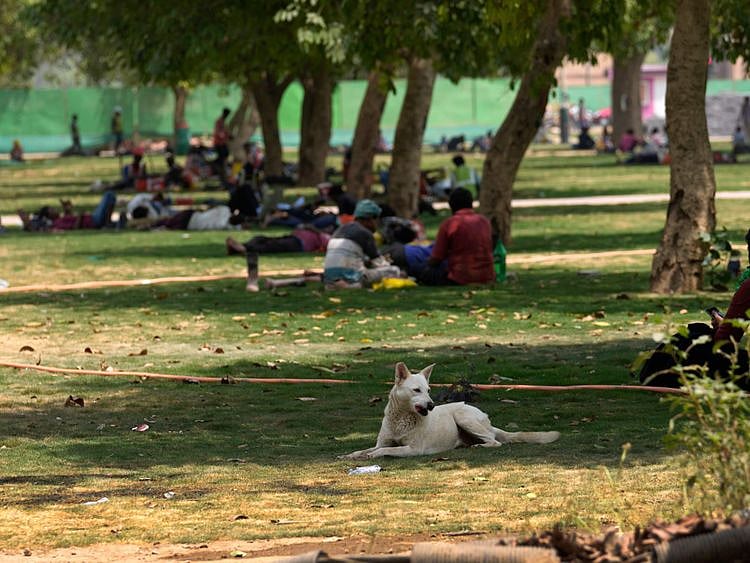Extreme heat kills at least 25 in India’s Maharashtra state
As power demand surges, generating companies are staring at massive shortages of coal

NEW DELHI: India’s western state of Maharashtra has registered 25 deaths from heat stroke since late March, the highest toll in the past five years, with more fatalities likely elsewhere in a country sweltering in temperatures over 40 degrees Celsius.
Scientists have linked the early onset of an intense summer to climate change, and say more than a billion people in India and neighbouring Pakistan were in some way vulnerable to the extreme heat.
With cooling monsoon rains only expected next month and increasingly frequent power outages in some parts of India, even households that can afford air conditioners will have little respite over the next several weeks.
Many of the deaths in Maharashtra occurred in the more rural areas of India’s richest state.
“These are suspected heat stroke deaths,” Pradeep Awate, a Maharashtra health official, told Reuters.
India is the world’s second-biggest wheat producer, but the heat is set to shrivel this year’s crop, after five consecutive years of record harvests.
As power demand surges, generating companies are staring at massive shortages of coal and the government is pleading with them to step up imports.
India recorded its warmest March in over a century, with the maximum temperature across the country rising to 33.1 degrees Celsius, nearly 1.86 degrees above normal, according to the India Meteorological Department. Many parts of India’s north, west and the east saw temperatures surging past 40C last month.
In the eastern state of Odisha, authorities said a 64-year-old man died of heat stroke on April 25 and hundreds of others have been given medical treatment.
In Subarnapur, Odisha’s hottest district, a high of 43.2 degree Celsius was recorded on Tuesday.
“It is so hot,” Subarnapur resident Mohana Mahakur said.
“Fan, air cooler - nothing is working.”
Several birds taken to hospital
As the scorching heatwave continues across Delhi and NCR, several birds suffering from heatstroke were admitted to a bird hospital in Gurugram.
Dr Rajkumar of Charitable Bird Hospital, Gurugram told ANI: “Several birds came here to Charitable Bird Hospital in Gurugram due to heatstroke. Since the beginning of last week of April, the cases of heatstroke in birds have increased.”
“So far, about 198 birds have been victims of it,” the official said.
The people of Delhi and several northern states are battling intense heatwave for weeks now. The India Meteorological Department (IMD) on Monday said that the temperature in parts of India, including the national capital, Punjab, Haryana, and Uttar Pradesh will not rise exponentially for the next 6-7 days.
The weather agency has also said that Delhi will receive rainfall on Tuesday.
“Heatwave is over in most parts of India including Delhi, Punjab, Haryana and Uttar Pradesh. Western disturbance is quite active. The temperature will not rise for the next 6-7 days. Northwest India has a yellow alert for thunderstorms. Delhi to receive rainfall on 3 May,” Senior Scientist, IMD, RK Jenamani said to ANI on Monday.
Heaven, paradise, mesmerising, say tourists in Kashmir
Tourists from all across the country, meanwhile, are rushing towards the scenic valleys of Jammu and Kashmir to escap the heat.
“Weather is so pleasant in the valley right now, I’ve had a lot of fun visiting here. There are so many places to visit, this is the perfect time to enjoy Kashmir” said Deepika, a tourist.
A large number of tourists can be seen visiting Srinagar to enjoy the Shikara rides in mesmerising Dal Lake and see the beauty of Mughal gardens.
“There is no comparison of Kashmir with any other place in the country in terms of nature’s beauty. I am happy to see the cleanliness of every place I visit here. This is the best time to visit Kashmir. The air here feels completely different, it is clean. Yeh sach hai agar kahi Jannat hai toh wahi yahe hai (It is true if there is a paradise anywhere, it is in Kashmir),” said Sumesh Koul, another tourist.
Sign up for the Daily Briefing
Get the latest news and updates straight to your inbox
Network Links
GN StoreDownload our app
© Al Nisr Publishing LLC 2026. All rights reserved.